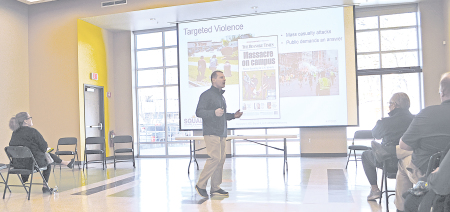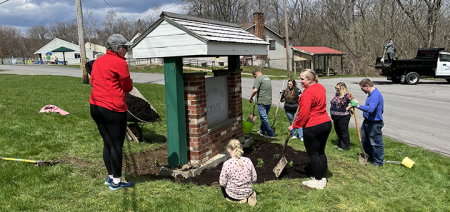NY Farm Bureau Unveils 2021 National Public Policy Priorities
Published:
March 1st, 2021
NEW YORK STATE – The New York Farm Bureau outlined its federal public policy agenda last week as farmers from across the state are meeting virtually this week with their U.S. Senators and Congressional Representatives.
The main priority issues range from agricultural labor reform and COVID relief to trade policy and climate change mitigation. NYFB President David Fisher and Senior Associate Director of Public Policy and National Affairs Lauren Williams unveiled the priority issues this morning during a Zoom press conference.
Agriculture Labor Reform
New York Farm Bureau is pleased to see President Biden’s immigration plan, the U.S. Citizenship Act of 2021. It offers hope for farmworkers who are currently in this country to remain here with legal permanent resident status, but the legislation still does not address the long-term needs of the country’s farmers, farmworkers, and food supply.
This is an issue NYFB members have been discussing for years. We need a comprehensive approach that takes into account people who are already working on farms as well as the seasonal and year-round farm needs in the future. NYFB views the President’s proposal as a starting point with many more discussions to be had. This includes reforming the H-2A federal guest worker program to allow farms to be matched up with foreign workers who would choose to stay for longer than a growing season. This would be helpful for the state’s dairy farms that operate all year long.
“Smart reforms that address the 21st century needs of our state and country will provide more stability for our food system, our employees and our rural economy,” said President Fisher.
COVID-19
Another priority for NYFB members is following up on the continued needs related to the pandemic. This includes farmworker protections. Despite recommended CDC guidance, the vaccine rollout in New York State so far has not included people who work in agriculture. This must change. We must protect the health and safety of these essential workers that our food supply relies on in this country. One of the obstacles has been the supply of the vaccine. NYFB is encouraged as production ramps up and more is being made available, but our organization will continue to make the case with federal officials that more should be targeted to the farming community along with necessary personal protective equipment.
NYFB will also continue to advocate for farmers impacted by COVID to receive needed assistance through federal programs. The Coronavirus Food Assistance Program also known as CFAP is currently under review by the Biden administration. We are hoping that process will be swift and are pleased applications are still being accepted. NYFB will continue to work with the Small Business Administration and members of Congress to ensure provisions in the recently enacted COVID-19 resource and relief package meet the needs of our farmers.
NYFB values the USDA’s Food Box program. Much like Nourish New York, this federal effort helped pay farmers for what they produce and quickly moved food into the hands of people in need. We hope efforts to purchase food products and distribute them to food banks and emergency pantries will continue through 2021.
NYFB is looking for support from the federal government to expand the ability to process more meat and poultry in New York State. We saw last year what happens to the food chain when large meat processing facilities were forced to close because of COVID outbreaks. There is a lack of processing facilities here in New York, and one solution is assisting smaller processing facilities to transition to USDA federally inspected plants. This would allow more places for farmers to take their livestock and ease up on the backlog that exists.
We cannot forget the toll that the pandemic has taken on not just the physical health but mental health of rural New Yorkers as well. An American Farm Bureau poll that came out last month found two-thirds of farmers and farmworkers say the pandemic has had a negative impact on their mental health. This mirrors NYFB’s member survey and the increased number of calls to NY FarmNet which provides mental health services to people in the state’s agricultural community.
“We are making this a priority to expand programs that provide resources and address mental health challenges and opioid addiction in rural communities. Also, we support policies and legislation that provide stress assistance programs to farmers and increase farmer-facing training opportunities. We must work to increase awareness and reduce the stigma of rural mental health issues,” said Fisher.
Trade:
With a new administration comes a new approach to trade. NYFB is still learning more about the White House agenda as it comes to selling farm goods and products around the world. Farm Bureau is encouraging the Biden administration to continue to build back with China and maintain the Phase 1 agreement and ensure it is fully implemented. There were significant assurances of purchasing more U.S. farm products, and NYFB wants both sides to hold to that agreement.
NYFB also continues to monitor the implementation of the U.S.-Mexico-Canada Agreement, including its produce plan to assist New York’s fruit and vegetable growers. NYFB is asking the White House to join the comprehensive and progressive Trans-Pacific Partnership Agreement as well as expand opportunities with the European Union and the United Kingdom and other nations.
“There is much potential around the world for our farmers to sell the quality goods that they produce,” said Lauren Williams.
Climate Change:
Another important priority for our farmers is environmental policy and addressing the effects of climate change. This is a top priority for many in Washington as it is for farmers who know all too well the impacts of extreme weather conditions. It is important for farmers to have a seat at the table when discussing policy changes as well as receiving recognition and support for practices already happening on farms that are reducing greenhouse gas emissions. Climate smart farming practices can serve as carbon sinks, helping mitigate the amount of greenhouse gases emitted into the atmosphere.
American Farm Bureau recently analyzed EPA data and found that U.S. carbon sinks that included forests and crop land offset 12 percent of U.S. greenhouse gas emissions during 2018. That same report also highlights that cropland productivity has increased by nearly 50% since 1990 while net carbon emissions from farming remained consistent. This evidence shows that farmers are producing more food while using fewer resources and utilizing smarter practices.
This effort must continue. NYFB is supportive of voluntary, incentive-based tools and technical assistance for farmers and foresters to maximize carbon sequestration and implement smart farming practices, like no-till and the use of cover crops, to reduce greenhouse gas emissions. In addition, NYFB supports the development of private sector greenhouse gas markets that will incentivize greater sustainability practices on farms. Finally, federal policy should support farmers in reducing energy consumption and increase on-farm renewable energy production.
“Farms are part of the solution to addressing climate change,” said Williams. “Through all of this, it is important to find the balance that will also protect our members’ ability to operate. We must have a viable food system in this country for our own prosperity as well. We are ready to work with the administration on science-based, voluntary, and market-driven programs.”
- From the New York Farm Bureau
Comments








